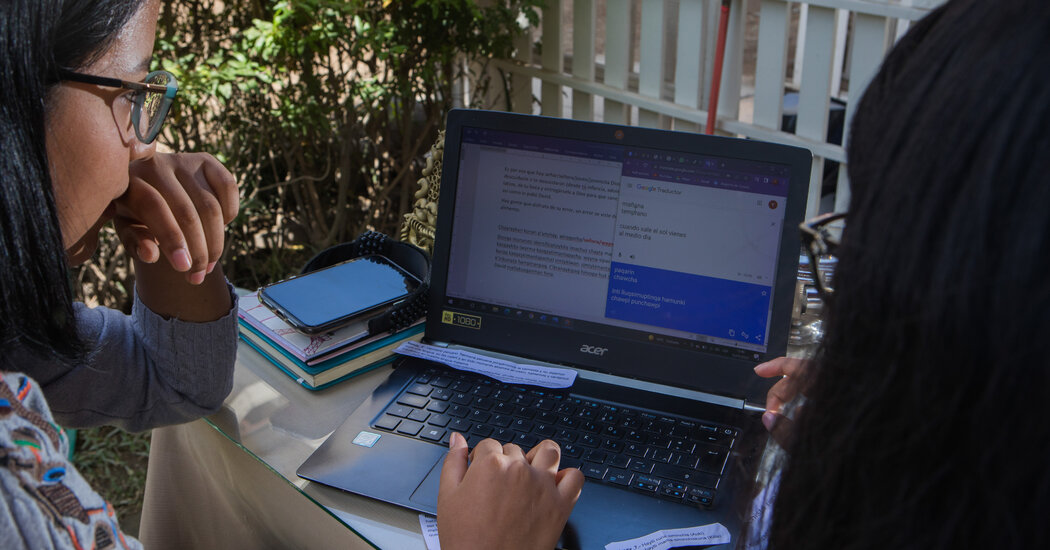
LIMA — When Irma Alvarez Ccoscco heard that the language she has spoken her entire life, Quechua, had been added to Google Translate, she hurried to her computer to try it out.
“I said: ‘This is it. The day has finally arrived,’” Ms. Alvarez Ccoscco, a poet, teacher and digital activist, recalled in a phone interview. She started with some basic sentences. “I didn’t want to be disappointed,” she said. “And yes, it worked.”
It was more than a new tool for communication; it was vindication that Quechua and its several millions of speakers in South America deserved greater voice and visibility, Ms. Alvarez Ccoscco said.
She and other Quechua activists had been making that argument for years. After all, Quechua is one of the most widely spoken Indigenous languages in the Americas. But now, “a company as big as Google says so,” she said. “It’s like saying to the world, ‘look, here we are!’”
Quechua — or more precisely southern Quechua, the main language in the Quechua linguistic family — was one of 24 languages that Google added to its translation service this month. Collectively, they are spoken by some 300 million people. Many, like Quechua, are mostly oral languages that have long been marginalized, spoken by Indigenous or minority groups.
Google said the aim was to include languages that are underrepresented in technology to “connect communities all over the world.”
The tool could also help health care workers, teachers, civil servants, police officers and others connect with speakers in their own communities.
“In the Andes, there’s a lack of bilingual professionals in very critical fields,” said Dr. Américo Mendoza-Mori, a Quechua-speaking scholar at Harvard University who studies Indigenous and linguistic identity. “There are millions of speakers that need to be served and treated as citizens of their own country.”
Eliana Cancha, a 26-year-old Peruvian nurse, said only two health workers out of 10 speak the Quechua language that is widely used in the region where she works, forcing many patients to try to explain what is ailing them by pointing at parts of their body.
“They can’t express themselves with the doctor as they should be able to,” said Ms. Cancha, a native Quechua speaker. “That means they’re not getting proper treatment.”
Quechua emerged among farmers and pastoralists in the central Andes of Peru more than 1,500 years ago. By the fifth century, it had expanded into two main groups, with even more variants, and by the 15th century, the Incas adopted one of them as the lingua franca of their vast empire, stretching from Colombia to Argentina.
Today, Quechua languages are estimated to be spoken by some 8 million to 10 million people in South America — mainly in Peru, Bolivia and Ecuador. Southern Quechua is by far the most widely spoken, with as many as seven million speakers.
Until recently, Google Translate’s machine-learning system needed to see translations of a language into other languages it knows to master it, said Isaac Caswell, a research scientist at Google Translate. But the tool has so much experience now that it can learn to translate a new language with little more than the text in that language.
Mr. Caswell likened the learning process to a polyglot being locked up in a room with nothing but a stack of books in a new language; if given enough time, the polyglot could figure it out.
Underrepresented languages like Quechua have a growing online presence and so Google’s translation model learned the language by culling the public web for text written in that language.
“As more communities come online, it’s more possible to do this sort of thing,” Mr. Caswell said.
Lingala, a Central African language, was also just added to Google Translate, though it is spoken by some 45 million people. European languages like Swedish, Finnish or Catalan with much smaller numbers of native speakers have been on the translation tool for years, mainly because they have been overrepresented in online text, Mr. Caswell said.
“People are celebrating,” said Maryk Francq Mavie Amonga, a production assistant for the multilingual news service Africanews and a native speaker of Lingala. “There are many places that don’t know of us yet.”
A little over a decade ago, Quechua was barely on the internet, said Ms. Alvarez Ccoscco, the activist.
But she and other Quechua language activists have been busy digitizing dictionaries, adapting open-source software to Quechua, writing Quechua-language blogs and e-magazines, and offering up Quechua versions of everything from colonial screeds and short stories to video games.
“Google is really joining this existing ecosystem of digital efforts of making sure that the language is there,” said Dr. Mendoza-Mori, the Harvard scholar.
He said there was a growing movement in the Quechua-speaking community in recent years that has embraced the language and fought stereotypes that portray the language as a relic of the past or a cultural curiosity.
Yeni Erazo, 24, a health administrator in Lima, said that while her family raised her to take pride in speaking Quechua, she was bullied for speaking it at elementary school. Even at the prestigious university she attended, she said, “people would look at me weird.”
But she found a group of native Quechua speakers who not only liked to speak Quechua, but liked to speak it loudly, as she did. Together, they made a digital magazine in Quechua focused on cultural identity, with 11 editions so far, and now she is working on a series of TikTok videos to promote more Quechua discussion on social media.
“When I speak in Quechua, I feel like myself,” she said. “Why shouldn’t I take pride in it?”
After the Spanish conquest of the Incan Empire in 1532, Quechua came to be seen as a sign of backwardness or a source of suspicion by the new ruling class. Its use was officially banned after the Indigenous leader Túpac Amaru II led a revolt that swept the southern Andes in the late 18th century, ending with his public torture, dismemberment and beheading.
Still, Quechua speakers continued to make up a majority of Peru’s population in the early 20th century.
But by 2017, the percentage of Peruvians who identified Quechua as their first language was just 14 percent.
As Quechua speakers migrated from the Andean highlands to cities — some seeking opportunity, others uprooted by conflict — the language was not passed on to new generations.
In the ’80s and ’90s, bloody battles between leftist insurgents and state security forces decimated Quechua-speaking villages, leaving behind so many tortured bodies and mass graves that the families of “the disappeared” are still collecting their remains today.
In Lima, where many fled to escape, “you couldn’t speak Quechua openly because you’d be considered a communist, a terrorist,” said Ricardo Flores, a Quechua rapper, historian and teacher who grew up partly in San Juan de Lurigancho, a district in the capital with a high concentration of Quechua speakers.
Mr. Flores said that even today, “guys in markets and parks, they pretend they don’t speak it.”
“But they do,” he said. “They just do it at home.”
A stigma has hung so heavily over Quechua that it is not clear if the language is growing or in decline, Mr. Mendoza-Mori said. While Peru’s last census registered an uptick in speakers of the language, it may only be because more people are willing to acknowledge they speak it, he said.
Even as Quechua speakers celebrated its inclusion on Google Translate, a law professor at a prominent university in Lima made headlines for asking why it was still spoken, praising French, German and Italian as languages of culture and science.
Other important strides have been made. In 2016, Peru’s state media channel TVPerú added a Quechua-language news shows to its daily programming. In 2019, a doctoral student, Roxana Quispe Collantes, wrote and defended the first thesis in Quechua in Peru.
Of all the translations of Quechua that Ms. Alvarez Ccoscco tried, she said one in particular filled her with pride: “Musqusqaykimanta astawan karutaraq chayasaqku.”
It was a line written by the Peruvian writer José María Arguedas in a poem dedicated to Túpac Amaru II, which she said Google translated more or less correctly to, “We’ll get farther than you ever dreamed.”




